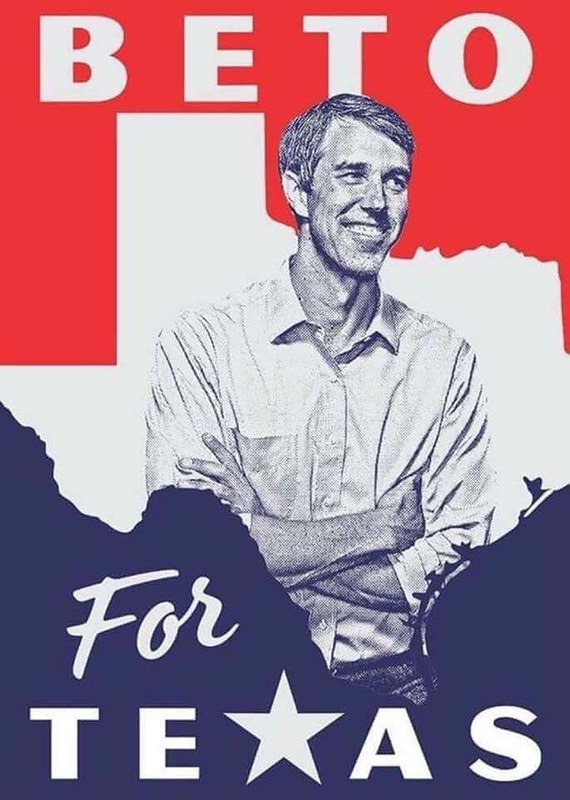Texas Governor Election: Conservatives Are Voting Blue— Why?
The citizens of Texas need our support. Beto for Texas!
This November, thirty-six states will participate in a gubernatorial election—a biennial election for the governor of a state, someone who oversees and implements all state legislation—but let’s take time to focus on the state that has pulled in an obscene amount of attention within the past year: Texas.
At the end of last month, Democratic candidate Beto O’Rourke and current Republican Governor Greg Abbott faced off in their sole debate. For those who didn’t watch/had no idea it occurred, allow me to set the scene as best as possible.
The candidates sit at desks adjacent to each other as the rather strict rules are read aloud. Very little time increments are permitted: sixty seconds to answer the question, (if applicable) thirty seconds for follow-up responses, up to thirty seconds for rebuttals, and at the end of the debate will have thirty seconds for closing statements. Beto struggles less with this touch-and-go pace and is able to fit more into each response as opposed to his opponent who struggles not only with the pace but with answering the question at hand.
Immigration is the first topic discussed. Abbott relies heavily on what he’s done to protect the Texan citizens, never once briefing on benefiting any immigrants, never discusses where they go once removed from Texas. Abbott runs over the sixty second mark to make a claim against his opponent.
Beto has a very different approach. He acknowledges the predictable manner of the current governor, discussing his tendency to blame the president, lie about Beto’s record, and to mainly distract from his failures as governor. He points out that Abbott has held office for eight years at this point— he was elected during President Obama’s second term and has therefore served under three different presidents— invalidating Abbott’s claim of trying to ‘fix’ the border issue and of the Biden administration being entirely at fault for the rising numbers in illegal immigration.
Beto then discusses exactly what you expect he would. He not only discusses the desired protection of citizens of Texas, but zeros in on having a safe border that is willing to accept immigrants under the correct process.
During the first sentence of Abbott’s follow up, he blames the president for his lack of securing the border despite Abbott’s $4 billion (of Texan’s taxes) into Operation Lone Star1. Immediately after blaming the president he then again attacks Beto, making the claim that the immigration issue would stay the exact same, if not worsen under Beto’s administration.
Once permitted thirty seconds for rebuttal, Beto discusses the statistics behind Operation Lone Star, claiming it a failure. When discussing Abbott’s abuse against the citizens of Texas, he uses the pronoun “we” which reinforces his place as a citizen, and his unity with the public, a simple yet incredibly effective strategy.
After the first question of the debate, the viewers already get a pretty sufficient glimpse into what the remaining fifty minutes of the debate will entail.
There are four main and controversial topics discussed throughout the debate: immigration, crime, gun violence, and abortions, none of which phase the democrat; the closing Abbott struggles to answer especially once confronted with the question of whether he believed that emergency contraception was the “alternative” for someone who became pregnant from rape or incest inTexas, despite abortion’s illegality state-wide, New York Times reports.
Since the beginning of his political career, Beto has supported women’s rights. To this day, he vows to repeal Texas’s abortion ban if elected. Because this controversy is so strongly debated, so many lives are at risk, and because it affects such a large group of the population, Beto will collect a large number of votes from those who support women’s autonomous rights, regardless of if they usually vote for the Republican party, Independent parties, or even those who have never voted before.
As aforementioned, Beto feels strongly about immigration involving the US-Mexico border. He has said time and time again, those who seek residence in the United States are welcome, but have to go through the legal process correctly as opposed to his opponent’s efforts of getting rid of them and keeping them there.
It is clear that the debate humbled Abbott’s confidence in a clean sweep election victory as opposed to all of the prior runnings in his career. Abbott hasn’t had to do a lot during his debates, seemingly banking on the democratic candidate to screw up and for him to immediately attack that weakness. But with Beto’s sophisticatedly educated experience from his 2020 presidential campaign, the last thing he is going to do is get distracted.
Abbott’s goal during this debate was to derail any claims made against him and to focus on the supposed flaws of his opponent’s plan for Texas; he needed to make it through without bringing too much attention to his failures as governor, most prominently the Uvalde shooting2. Beto’s goal during this debate was to promote and advocate for himself and the people of Texas, instantaneously shutting down Abbott’s accusations before bringing the attention back to his prosperous agenda.
As a daily counselor for kids ranging from five to ten years old, this debate reminded me of a child of destructive behavior throwing a temper tantrum while I try to reason with them in a mature and calm way. This happens often; children don’t care for reasoning, they want what they want and if they don’t get it, they immediately result in insulting and attacking you.
If you haven’t picked it up by now, Abbott is the child in this case. And I’m not quite sure if Abbott knows that insulting Beto isn’t going to make him roll over and deliver the election to him on a silver platter.
Do I think Beto will come out victorious with the title of governor triumphantly on his chest? To put it simply, no (doesn’t mean I’m not hoping for a win). For the current feeble state of Texas and keeping it’s inclination to vote red in mind, his views are too liberal, especially immediately after the extreme anti-abortions law placed into effect by Abbott in early September.
I think Beto would have benefited greatly had Texas had more time to settle before the gubernatorial election. Though, the most recent poll conducted at The University of Texas at Austin showed Abbott retaining his five percent lead, which has dropped from the double digits since the last poll taken in June. Revisiting the last election for governor in 2018, Abbott ultimately obtained an approximated thirteen percent lead against his opponent, a much larger gap than the current standing.
But prior to any debate, prior to any polling, it was predicted that Beto’s popularity and success in the campaign would be an astronomical disaster but as we get closer and closer to November 8th, the El Paso native is seemingly continuing to change that narrative. Given Abbott has been trying to hold onto the lead, he’s making himself out to be the complete opposite of Beto, confirming his progressively obvious detachment from the Republican Party and towards the extreme left, which has wound up doing more harm than good in the sense of the election.
If anyone knows anything about politics, it’s that politics are indescribably unpredictable and with just under a month left, it’s entirely possible for Beto to become the underdog in this election. Very few of us will be able to participate in this year’s gubernatorial election, and none of us will be able to participate in Texas’s gubernatorial election, we, as citizens of the United States, need to recognize that the citizens of Texas need freedom, they need rights, they need protection, they need security— none of which should have been stripped from them in the first place.
Thus, donate when you can, spread awareness as much as possible, and most of all educate yourselves. The citizens of Texas need our support. Beto for Texas.











